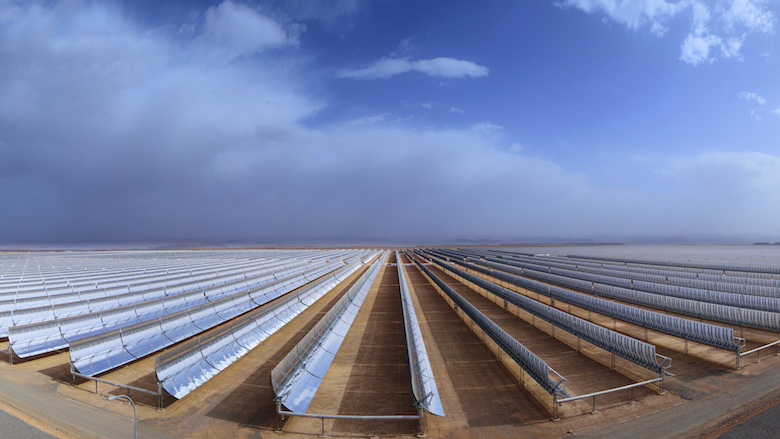A solar power plant in the Moroccan desert is so big it can be seen from space. The Noor Concentrated Solar Power Complex is the world’s largest development of its kind. Financed by the Climate Investment Funds, the World Bank Group, and other partners, the solar complex supplies clean energy to 2 million people. It is the cornerstone of Morocco’s ambitious plan to meet 42% of the country’s energy needs with renewables by the end of 2020.
Countries are moving to reduce greenhouse gas emissions, adapt to climate change, and develop sustainably. They are investing in renewable energy, low-carbon transportation, and the preservation of vital ecosystems. They are changing their agricultural practices and building social protection systems for the vulnerable, among other measures. These efforts could be even more critical to support a sustainable recovery from the coronavirus pandemic.
But the world as a whole is not yet on track to avoid more dangerous impacts of climate change.
1.
Across sectors, the potential for double wins is significant. For instance, investments in low-carbon, climate-resilient development can help countries unlock human capital gains and, reciprocally, a stronger human capital base can help communities adapt to a changing climate.
While responding to drought in Ethiopia, for example, the Bank supported a large social safety net program to boost food security among the most vulnerable. “Adaptive safety nets” like these are an efficient way to help people after a major shock: they use existing social protection schemes and can quickly expand, increasing the number of beneficiaries and the sums transferred to them. During the 2016 El Niño-influenced drought in the Horn of Africa, Ethiopia’s safety net was expanded to temporarily cover 18.5 million people – 20 percent of the population – to avoid a famine and protect them from falling into poverty. The program also provides regular cash or food to people in exchange for land restoration work, irrigation, and agroforestry, thereby also boosting eco-systems and agriculture.
In fiscal year 2019, for instance, climate “co-benefits” were achieved in a waste-to-energy project in Belgrade, Serbia, that will clean up one of Europe’s largest uncontrolled landfills and construct a new, sustainable waste-management complex to help reduce pollution and mitigate climate change. The project will enable the use of municipal waste and landfill gas to generate renewable heat and electricity. The new facilities will provide electricity equivalent to the total power consumption for approximately 30,000 households during winter, replacing fossil fuels and helping to reduce greenhouse gas emissions.
2.
Climate pledges made ahead of the landmark 2015 Paris Agreement, known as Nationally Determined Contributions, or NDCs, represent an estimated $23 trillion of potential investment in sustainable development by 2030 for 21 emerging market economies alone.
Through the NDC Support Facility the Bank Group is working with countries around the world to help unlock these climate-smart opportunities, ranging from support that expands low-carbon transport to innovative GIS mapping of climate risk. In Vietnam, an NDC “Deep Dive” is laying the groundwork for policies and investments to advance climate goals through a whole-of-government approach in four critical areas: low carbon energy, low carbon and resilient transport, climate-resilient landscapes, green and resilient urban development. In Mali, adaptation efforts got a boost through the development of a climate-smart agriculture investment plan. Developing the plan helped to bring on board a wide range of stakeholders from public, private and civil society; improved policymaking and private sector investment in projects; and helped forge strong partnerships across sectors and ministries. Similar investment plans have also been developed in Morocco and Cote d’Ivoire.
3.
The Bank is working with Ministers of Finance, Budgeting and Planning, through the Coalition of Finance Ministers for Climate Action, to help countries design and implement climate policies, coordinate efforts, and bring climate considerations into the mainstream of economic policy. Established in April 2019, under the joint leadership of Chile and Finland, the Coalition now comprises almost 60 countries accounting for nearly a third of global economic output.
Under the coalition’s Santiago Action Plan, Finance Ministers agreed to help countries mobilize and align the finance needed to implement their national climate action plans and meet the ambitious targets set in their NDCs.
Côte d’Ivoire, for example, aims to reduce its greenhouse-gas emissions by 28 percent and increase renewable energy to 42 percent by 2030. With help from the NDC Support Facility, the IFC and the government developed a roadmap to unlock private investment and meet the goal. Côte d’Ivoire is also supported through the Bank Group's Scaling Solar Program – a “one stop shop” that aims to make privately funded grid-connected solar projects operational within two years and at competitive tariffs. Scaling Solar will help the country develop two solar plants generating a total of 60 megawatts that will power thousands of homes and businesses, bringing Cote d’Ivoire closer to its target of generating 400 megawatts of solar power by 2030.
